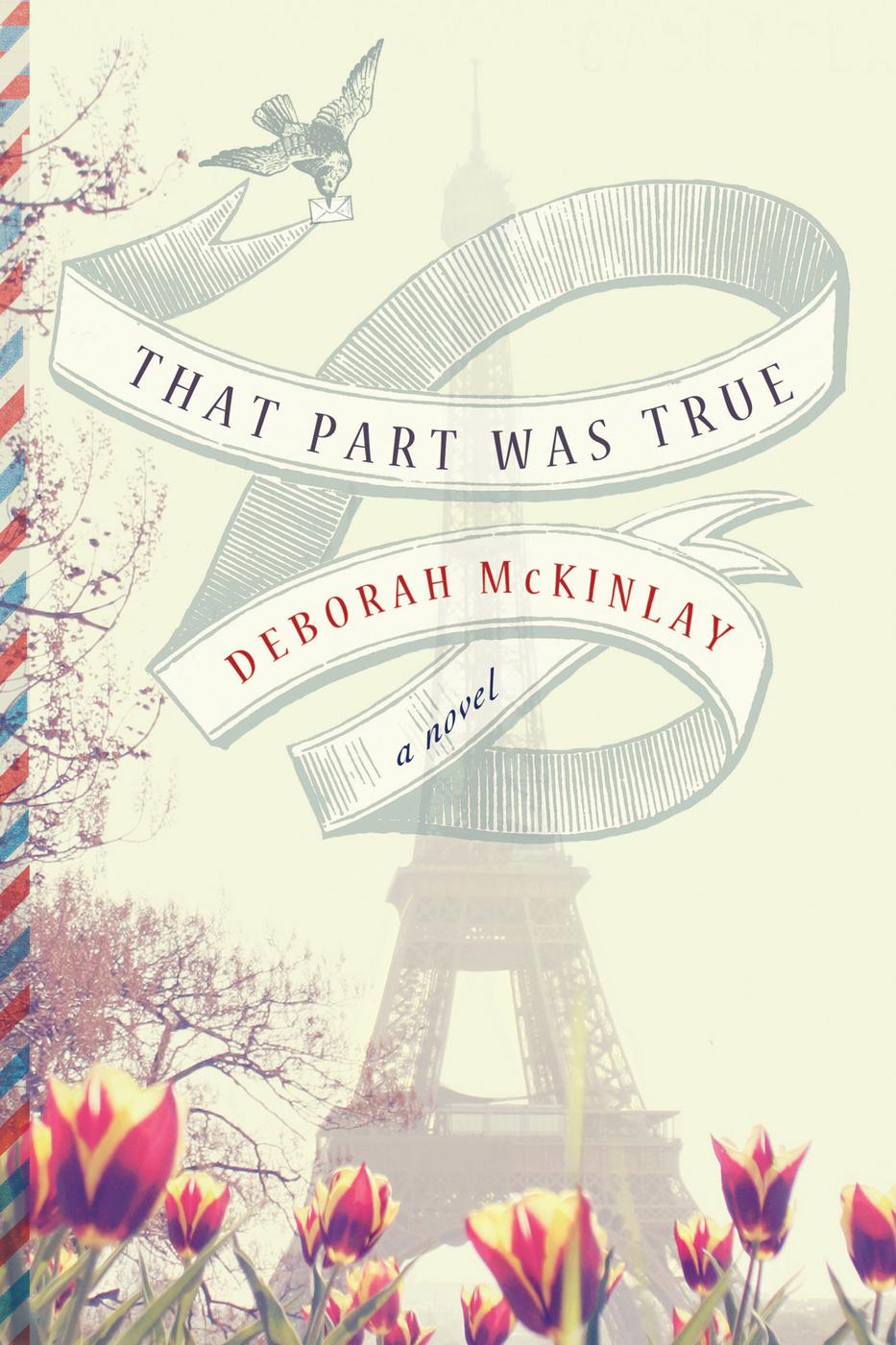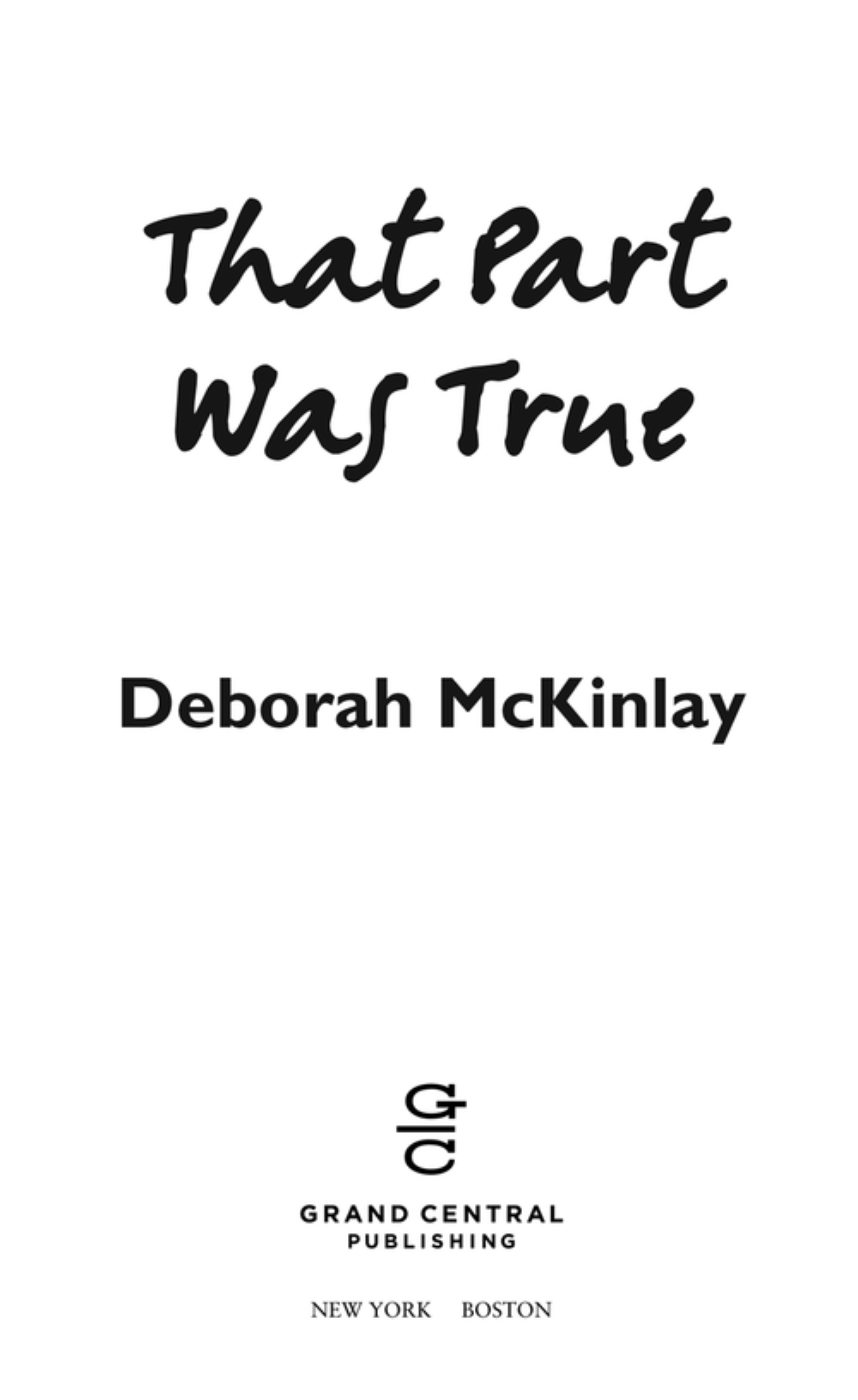That Part Was True
Read That Part Was True Online
Authors: Deborah McKinlay




In accordance with the U.S. Copyright Act of 1976, the scanning, uploading, and electronic sharing of any part of this book without the permission of the publisher constitute unlawful piracy and theft of the author's intellectual property. If you would like to use material from the book (other than for review purposes), prior written permission must be obtained by contacting the publisher at [email protected]. Thank you for your support of the author's rights.
For my father
With thanks to Alexandra Machinist
and Deb Futter.
Dear Mr Cooper,
I could probably contact you more directly by e-mail, but the effort of handwriting will encourage me to choose my words carefully and I am conscious that I am writing to an author.
I wanted to tell you that I enjoyed your book âDead Letters' very much. The scene where Harry Gordon eats the peach (âleaning over and holding back his green silk tie with one arm while the juice christened the shirt cuff of the other') introduced a moment of summer into a watery English day. And it reminded me, as well, of the almost decadent pleasure that comes with eating fully matured fruitâsadly, a rarity.
With best wishes,
Eve Petworth
Dear Ms. Petworth,
Thank you for your very kind words. It is always a thrill to hear from a reader and an even greater one to receive a letter. (Sadly, a rarity.)
I agree with you about the fruit. Mostly, we get the plastic stuff, too. I read once that the underripe kind is only good for what you British folks call jam. I am not a jam maker, but your letter has made me think about the value of putting effort into things so maybe I'll give it a shot.
Sincerely,
Jackson Cooper
“Hellooo.”
Jack knew that hellooo, and at any other time it would have irritated the hell out of him, but at five o'clock on an afternoon when you have spent most of the day pondering the recent collapse of your second marriage, any kind of distraction is welcome. It was Lisa Milford. She lived across the street from Jack on Sea Lane.
“Jackson, I just heard about you and Marnie,” she said.
She had let herself in, through the kitchen door, just as she had many times before. Lisa was a talker and she had found in the past a listener in Marnie.
“I am so sorry,” she said.
Lisa had evidently been playing tennis because she was wearing a tennis dress. She was a petite, glossy brunette, and the dress created an impression that would have been entirely doll-like had it not revealed fine splashes of freckles on her bare upper arms.
Jack, happily relieved of his own company, smiled and greeted her warmly, more warmly than he ever had before. Lisa Milford had, until that moment, been a peripheral element in his life, like the faint buzz of distant machineryâeasily ignored.
This evening, though, they stood awhile and then sat, on wooden kitchen chairs angled away from the table, toward each otherâtoes aligned, torsos relaxed, conversing easily, like comrades, parents at a school gate, bonded by the sturdy adhesive of shared experience; Lisa's husband had left her, after a lengthy affair, the previous summer. Jack felt that the least he could do was to offer the woman a drink.
And then another.
And then, even in the case of a talker, it seemed, Jack's brain switched off and nature made its siren call to other parts of his anatomy.
Lisa, who was lonely, and who had been aware in any case of the magnetic effect of Jackson Cooper's presence for almost three years, fused to him immediately in response to the first, slight, signaling linger of a hand at her waist, so Jack did not have to be particularly active in the encounter that followed her accidental brush against him as he was pouring their third glass of wine. And then, a few minutes later, in what the realtor had referred to as “the garden room” and nobody had ever referred to specifically since, when Jack eased them both deftly backward onto a daybed covered with blue and white ticking that Marnie had liked to lie on to watch the sunsets, Lisa's two immaculately manicured hands met his chest with keen, and not inconsiderable, gusto.
Jack, while not engaged in this liaison with any more than instinctual enthusiasm, would, nevertheless, have proceeded with it except that, just as Lisa twisted to remove the last, gossamer barrier to undiluted commitment, she emitted a modest, girlish giggle, and the sound punctured something in him. His senses rallied. Or rather didn't. Nature, having previously taken over his physical and mental functioning, suddenly, and entirely, deserted him.
For the moment this development was lost on Lisa. She turned to him again and advanced with neat, energetic intent. But eventually, her breaths slowed and flattened.
“Ja-ack?” She scooted back and looked down at him.
Jack, meeting her face, caught her eyes and saw there a woman, an ordinary woman, too human. He quit, lifting her hips from his groin, and sat up.
“Sorry, honey,” he said, pushing hair from his forehead and standing, dislodging her.
Lisa, upright and naked, trembled lightly and said softly, “Don't worry, Jack.
I'm
not gay.”
Jack stared.
“And Marnie probably always was,” she added quickly and, she imagined, sympathetically. “You don't turn people gay, they just
are
.”
Jack, speechless, fastened his trousers and went to retrieve the tennis dress.
“Thanks,” Lisa said when he handed it to her, but rather than put it back on, she held it with one hand, bunched against her breasts. “Maybe we should just go to my place,” she suggested, “and relaxâhave a drink and sit in the hot tub, or something.” She leaned toward him and raised four tender, encouraging fingers to his cheek.
Jack, removing the fingers by the wrist as if he were extricating a caterpillar from his salad, pulled back from the embrace. “I'm gonna pass tonight,” he said. And then he smiled, to soften it, relieved to see Lisa, at last, make a move toward dressing. She looked small, and vulnerable, bending to scoop up her underwear.
“I'm sorry, honeyâ¦we'll do something later in the week. I'll call you.”
“Promise?” she said.
“Promise,” he said.
She was still smoothing the tennis dress against her hips when he opened the door.
 Â
Much later, quite a lot drunker, Jack took a postcard from the top drawer of the big, oak desk in his study. On one side there was a picture of the sea, a mass of glorious turquoise. His eye, though, went to a red boat, barely sketched, in the top-right-hand corner. It was an appealing picture, a reproduction of an oil by another of his neighbors, Julie Hepplewhite. She had a studio-cum-gallery setup on Melon Walk. The sort of place, Jack had noticed, that the Hamptons, and especially Grove Shore, lately seemed full ofâconspicuously picturesque, and a bit strained, although Julie'sâThe Gallery on Melonâwas better than most, Jack thought. At least she could paint.
But now, looking at her work, flicking the switch on an angle-poise lamp, no warmer aspect of Julie, of Julie herself, came to him. She'd been a vanilla conquest, the counter of this evening's aborted fumble, an effortless progression from a late night meander home after a party, as routine as lacing a shoe. The incident had been all but forgotten by both of them. At the gallery, if Jack wandered in behind the tourist crowd on an aimless Saturday, to scan the walls noncommittally and pick up a few postcards, Julie would smile and say, “Hey, Jack,” when she rang up the sale. And he'd say, “Hey, Julie,” back. Vanilla.
Jack, turning the card over, took a black pen from an empty coffee can that held, as always, a dozen of them and wrote:
Dear Eve Petworth,
Are you a cook?
Jack Cooper
Â
In the depths of the English countryside, in a house that was an advertisement for the English countryside, Eve Petworth moved a neatly angled, silver-framed photograph a few inches to the left in order to place a crystal bud vase on top of a rarely played piano. She held the yellow blooms it contained briefly, and absently, to her face. It was a vague gesture; she was preoccupied and didn't pay much attention to the scent. In any case, the scent of those rosesâ
Golden Celebration
, she could have told youâwas as familiar to Eve as that of beeswax, or bay leaves, or lemon peel. Then she turned and watched Izzy.
Izzy, who had entered the room behind her mother, crossed it purposefully. She flipped a window latch and swept back the pane as if to fly through it.
Eve waited, rather meekly, she the child momentarily and Izzy the parent, for Izzy to tell her what to do. She didn't wait long.
“We'll have Campari,” Izzy announced. The sunlight, behind her now, emphasized her blondness.
Her indomitable blondness, Eve thought, so dramatic compared to her own faded russet.
“Yes,” she replied. She hated Campari.
 Â
Afterward, they ate pheasant casserole. Eve had taken the casserole from the freezer that morning, removed it from its plastic container, and reheated it without ceremony, ignoring the sticky label on top, which, in her own hand, stated, “Sauce needs work.” The sauce did need work, she thought after her first, testing mouthful. She spooned some salt from the silver dish in front of her and sprinkled it over her plate, but it didn't improve things much.
Izzy did not comment on the sauce, merely ventured with mild, almost unconscious, disapproval that pheasant casserole was a bit wintry for a June lunch. She was right about that, of course. But Eve had found that the will even to cook for this particular occasion had deserted her. They were marking the anniversary of Eve's mother's, Izzy's grandmother's, death. Virginia Lowell had died on a bright, cool afternoon just like this one, exactly twelve months previously. It had been Izzy's idea to mark the day.
“I'll come down, Mummy,” she'd said, shouted almost, over the telephone from London the previous week.
Eve had been able to hear traffic behind her and had imagined Izzy, dressed in some modish work outfit, hurrying from one important thing to another important thing, making steady, thoroughbred headway.
“We should have a nice lunch together at least. We can't just behave as if it were a normal day.”
Eve had heard reproach in this and had acquiesced, the way she always did to Izzy, who had rung off, swiftly, leaving Eve with the severed end of the exchange. The plan had been set.
Now Izzy turned to the end of the table. She had brought a small portrait of her grandmother down from the girlhood bedroom she still used on visits, and propped it against the chair with the ghost in itâa wreath at a shrineâto watch over them while they ate. She tipped her wineglass to the vivacious face and said, “Chin-chin, darling.” Then she bit back a threatening tear with her usual brickish stoicism.
Izzy had been, Eve knew, not only heartbroken, but shocked by the death of her grandmotherâso little happened to Izzy that Izzy did not want to happen.
“But she was
young
,” she had protested, over and over, when Eve had telephoned her with the news, although Virginia had been almost eighty. Not that Virginia had ever publicly admitted her age. And no one who'd met her would have guessed it; she'd been a beauty to the last.
Virginia had been living with Eve, her only child, for seven years by the time she died, but Eve's house, despite its six bedrooms, four bathrooms, generous kitchen, and selection of reception rooms, had never accommodated the pair of them easily. It was a question of personality. Virginia had been a woman with personality for four. “I kept your share, dear,” she had said, more than once, to Eve, because, in addition to being a beauty, a wit, and a bon vivant, Eve's mother had been a bitch.
Eve, whose husband had flown the coop early, just as Virginia had predicted he would, had cared for her mother, tirelessly and dutifully, and donated to this enterprise her freedom, her confidence, and her self-respect. But these were things that Virginia had been robbing her of since birth, and particularly since Eve's father's death from a heart attackâa tragedy which his wife had quickly adopted as her own, regardless of their already tense marriageâwhen Eve was five.
Virginia's widowhood had hosted a variety of lovers and, transiently, a second husband, but her true affections had only ever been roused by Izzy, in whom she had seen herself. Today, Izzy had wanted to sit outside once the drinks were poured, and when Eve had explained that the garden furniture had been repainted the day before and was tacky still, she'd said, “You should have had it done at Easter,” in a voice that had brought Virginia, vividly, from the grave.
Thinking back, in the formal, dining room quiet, Eve could not remember a single sincere disagreement between her mother and her daughter. There had been many arguments; days when they'd each complained shrilly to her about the other's shortcomings. Those hysterias, though, had always waned as suddenly and irrationally as they'd erupted. And Eve had been outnumbered, and ignored, all over again.
 Â
After a more seasonal slice of lemon tart and some carefully neutral, on Eve's part at least, reminiscing about their very different experiences of Virginia over coffee, Izzy went to visit an old school friend, and Eve, relieved, cleared the lunch things.
Gwen had left for the day so Eve rinsed the dishes and stacked them in the dishwasher. She would have done, even if Gwen had been there. Gwen often said that she did not know why Eve paid her; there was so little for her to do these days. But, in fact, they both knew why Eve paid Gwen to come up from the village three times a week. She paid her for her company, her pleasant, unquestioning company.
Once the kitchen was orderly and pretty, a reflection of Eve herself, though she never would have seen it, she sat at the kitchen table beneath the window with the view of the plum tree and took Jackson Cooper'sâJack'sâpostcard from the back of the tan leather folio where she kept recipe clippings, and read it again.
Then she went into the library and sat at the rolltop desk, where she had sat to address the invitations to Izzy's christening and to sign her divorce papers and to make the lists of food she'd need for her mother's funeral, and she flipped open the lid of the slim blue computer that Izzy had brought her the previous Christmas. There was a contact e-mail address on the website.
Dear Jack Cooper,
No, I don't cook professionally.
Eve Petworth
For love then?
Jack
For reassurance, order and comfort. You?
For love.
Â
Jack lifted his beer to his lips and grimaced. “Don't keep buying this garbage, Dex. And if you do, don't bring it to my house. Bring European beer to my house, it tastes like beer. This stuff tastes like something pissed in it.”
“Go easy on me tonight, Jack.”
Jack, reaching affably for the cue, said, “Okay, I'll bite.”
“There's something on my mind,” Dex said, taking a relaxed slug of his beer.
“Love, or money?”
Dex laughed. “Do you think that's what it always comes down to?”
“Yes, in the absence of death, pestilence, and war. On the other hand, I may just be extraordinarily shallow.”
“Actually, there is a lull in my love life,” Dex said, checking his watch. “But it's only been fourteen hours, so I'm not letting it get to me yet. And my financial situation is pretty much status quoâi.e., inadequate.”
“Want any help with that?”